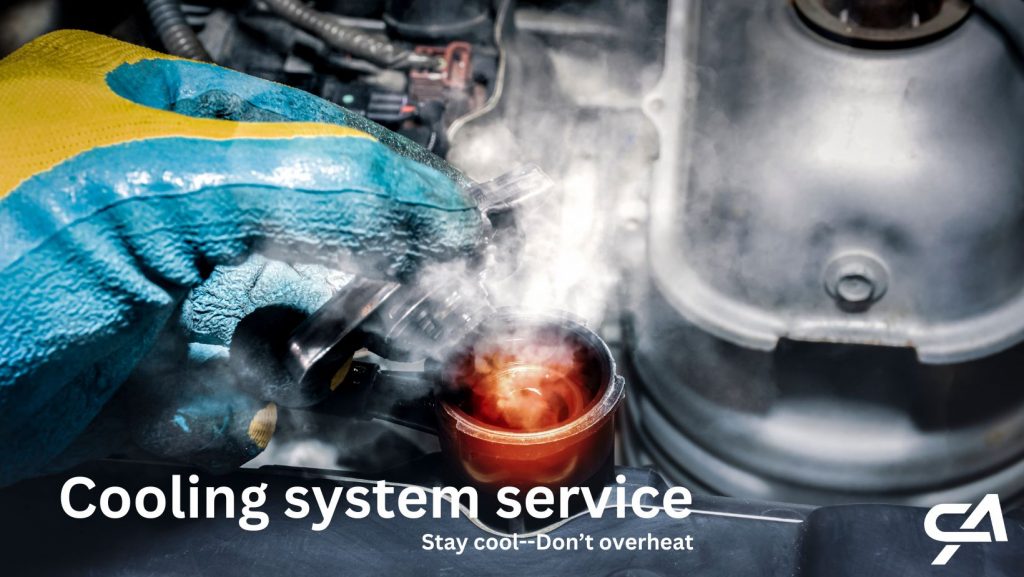Cooling System Service Defined: Proactive Maintenance for Peak Performance
Cooling system service involves a series of procedures to preserve the cooling system’s efficiency and functionality. This proactive maintenance ensures the engine operates within the designated temperature range, preventing overheating and safeguarding against potential damage.
Coolant Inspection and Replacement: Preserving Temperature Regulation
One of the primary tasks in cooling system service is inspecting the coolant. Over time, coolant can become contaminated, losing its effectiveness in dissipating heat. Technicians check the coolant for signs of discoloration, rust, or sediment. They perform a coolant flush and replacement to restore the system’s efficiency if necessary.
Thermostat Inspection and Replacement: Regulating Engine Temperature
The thermostat is a crucial component that regulates the flow of coolant through the engine. Cooling system service includes inspecting the thermostat for proper operation and replacing it if necessary. A malfunctioning thermostat can lead to temperature fluctuations, affecting engine performance.
Pressure Testing: Identifying Leaks and Weaknesses
Pressure testing is a diagnostic procedure integral to cooling system service. Technicians pressurize the system to identify leaks, weak points, or faulty components. Detecting and addressing issues through pressure testing is crucial for preventing coolant leaks and maintaining the system’s integrity.
Radiator Inspection and Cleaning: Enhancing Heat Dissipation
The radiator plays a central role in dissipating heat from the coolant. Cooling system service involves inspecting the radiator for corrosion, leaks, or blockages. Technicians may perform a radiator flush to remove accumulated sediment and improve heat dissipation efficiency.
Water Pump Inspection: Ensuring Efficient Coolant Circulation
The water pump is responsible for circulating coolant through the engine and radiator. Cooling system service includes inspecting the water pump for leaks, corrosion, or bearing wear. Addressing issues promptly is essential for maintaining proper coolant circulation and preventing engine overheating.
Hose Inspection and Replacement: Preventing Coolant Leaks
Cooling system hoses transport coolant between the engine, radiator, and other components. During cooling system service, technicians inspect hoses for signs of wear, leaks, or deterioration. Damaged hoses are replaced to prevent coolant leaks and maintain the system’s efficiency.
Cooling System Bleeding: Eliminating Air Pockets
Air pockets within the cooling system can impede coolant circulation and compromise its cooling abilities. As part of the cooling system service, technicians bleed the system to eliminate trapped air, ensuring optimal coolant flow and temperature regulation.
Cooling System Protection: Choosing the Right Coolant
The type of coolant used in the cooling system is crucial for its effectiveness and longevity. Cooling system service may involve selecting and using the appropriate coolant based on the vehicle’s specifications and manufacturer recommendations.
Manufacturer Recommendations: Adhering to Service Intervals
Manufacturers provide guidelines for cooling system service intervals. Following these recommendations ensures that the cooling system receives timely attention, preventing issues and preserving the engine’s overall health.
Signs of Cooling System Issues: Recognizing Red Flags
Regular monitoring of your vehicle can help identify potential cooling system issues. Signs such as overheating, coolant leaks, or fluctuating temperature gauges should prompt immediate attention and cooling system service.
The Importance of Cooling System Service: Safeguarding Engine Health
Preventing Overheating:
Cooling system service is instrumental in preventing engine overheating, which can lead to severe damage and costly repairs. Regular maintenance ensures that the system operates efficiently.
Preserving Engine Performance:
An optimally functioning cooling system contributes to consistent engine performance. Proper temperature regulation enhances fuel combustion and overall efficiency.
Extending Engine Lifespan:
Cooling system service plays a crucial role in extending the engine’s lifespan. Preventing overheating and addressing issues promptly contributes to the longevity of critical engine components.
Improving Fuel Efficiency:
An efficiently operating cooling system reduces the likelihood of overheating-related performance issues, contributing to improved fuel efficiency and overall vehicle economy.
Sustaining Resale Value:
Regular cooling system service, documented in maintenance records, enhances the vehicle’s resale value. Prospective buyers are more likely to invest in a well-maintained vehicle with a healthy cooling system.
Cooling system service is a proactive approach to preserving the health and performance of your vehicle’s engine. By addressing issues promptly, replacing worn components, and adhering to manufacturer recommendations, you ensure that the cooling system operates efficiently, preventing overheating and safeguarding the engine against potential damage. As a cornerstone of preventive maintenance, cooling system service contributes not only to the reliability of your vehicle but also to its longevity and overall value.

